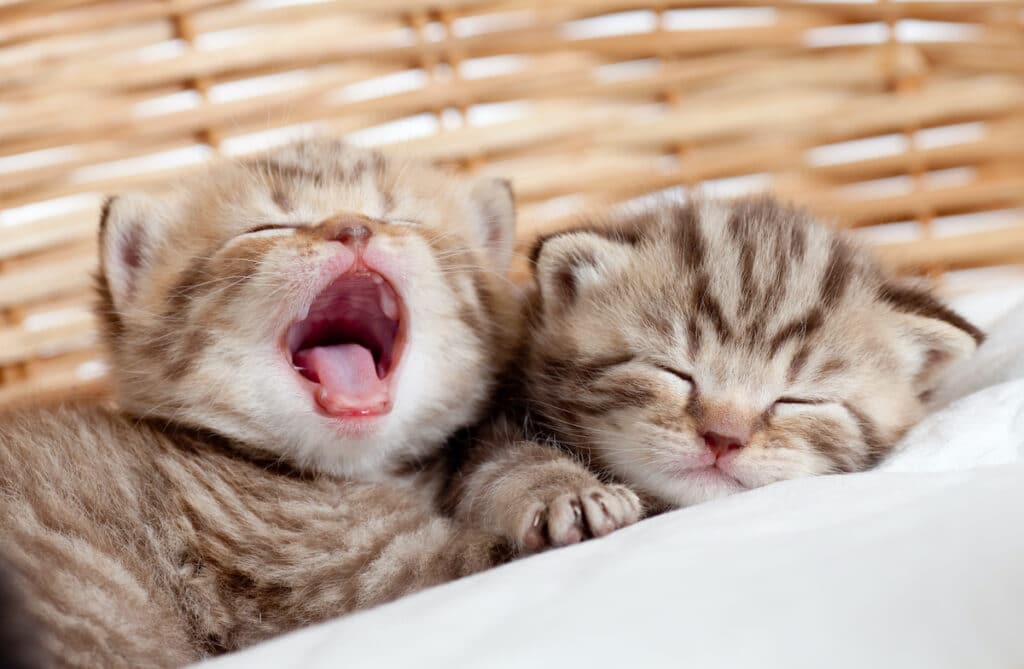Getting a new kitten is an unforgettable event filled with love, warmth, and laughter, but ensuring you know the basics of proper kitten care is essential. There’s a reason why there are so many kitten photographs and videos on the internet! Kittens are extremely lovable, affectionate, and entertaining. But do you truly know how to take care of a kitten? Hands-on attention from human family members and proper is required for kitten rearing. This comprehensive kitten care guide focuses on acclimating the kitten to its new home and ensuring its physical well-being to help promote healthy kitten development.
There are several stages in a kitten’s existence. It’s crucial to understand how your new pet’s demands may change as they mature. Proper kitten care includes visits to the veterinarian, regular kitten immunizations, and deworming, to name a few. There are also other forms of care that promote healthy kitten development throughout the kittenhood stages that we will share in this helpful kitten care guide.
Note: Affiliate links may be used in this post. I may receive a small commission at no extra cost to you if you use my affiliate link. Full disclosure policy here.
Kitten Care During the First 6 Months
One of the most common kitten care questions is the basic “how to take care of a kitten.” We’ve put together some fundamental guidelines for caring for your kitten during its first six months of life.
We’ll cover basic kitten care fundamentals for ages:
- Newborn Kittens – under the age of 4 weeks
- 5-11 Weeks of Age
- 2-4 Months of Age
- 4-6 Months of Age
Kittens Under the Age of 4 Weeks (Newborn Kittens)
Newborn kittens are still developing their motor abilities and coordination at this age. They’re also learning how to keep their bodies at a comfortable temperature. They rely on their mother for warmth at this point in their lives. If the mother cat is still with the kittens, kitten care from human caregivers includes providing a warm, clean, and safe environment, as well as proper nutrition and veterinary treatment for the mother cat.
Kitten Care for Orphaned Newborns
If the mother cat is unable to care for the kittens for whatever reason, the kittens will require a significant amount of attention in order to grow and survive. You should make an immediate appointment to see the vet with the kittens so they can assess their needs, particularly in terms of feeding and monitoring their progress.
How Often Should You Bottle Feed A Newborn Kitten?
Complete orphan kitten care includes bottle feeding kittens every 2-4 hours, keeping their environment warm and safe, and assisting the kittens with urination and defecation. If they’ve been separated from their mother and/or siblings, make sure they’re kept warm with pet blankets.

5-11 Weeks of Age
Newborn kittens should be weaned off their mothers or bottle around 4-6 weeks old and begin eating a high-protein, energy-dense diet. Their motor abilities and coordination should be improving at this point. Be aware that as this happens, your kitten will transform into a formidable opponent! Proper supervision is an essential part of good kitten care and is required for a kitten at this age to ensure that its increased sense of adventure and bravado does not lead them into unsafe circumstances. You may want to consider an indoor kitten pen for times you are unable to supervise.
2-4 Months of Age
This is a period of rapid development for kittens. Expect your fur baby to have much more energy than an adult cat, and be prepared to be awakened in the middle of the night by a playful pal wanting some attention! During this stage, a kitten’s care should involve a lot of bonding-based playing as well as three or four high-protein individual meals each day.
4-6 Months of Age
Your kitten is approaching puberty and, as a result, sexual maturity. This will cause a surge in energy and, at times, behavioral changes, comparable to that of a human adolescent entering puberty. It’s time to talk about and plan for your kitten’s spaying or neutering. Most kittens reach puberty between the ages of 6 and 8 months, and it is suggested that they be spayed or neutered before then. Talk to your vet for more information.
There are a variety of ways to enrich your cat’s habitat, which is especially crucial for kittens that live indoors. Invest in toys that help stimulate your kitten’s mind, especially if they may spend hours alone while you’re at work. During your next appointment, talk to your vet about how to create an enriched environment that gives just the perfect amount of stimulus for your kitten.

How Often Should You Feed Your Kitten?
As we briefly described above, optimal kitten nutrition entails changing its diet to ensure that kittens receive the nutrients they require at each stage of development.
A general breakdown of feedings by age:
- newborn – 4 weeks: every 2-4 hours
- 3-5 weeks: 4-6 times a day
- 5-8 weeks: 3-4 times a day
- 6+ months: 2-3 times a day
During the first four weeks of life, the mother cat should be feeding the kittens, or if the kitten has been separated from their mother, you should use a special commercial milk replacement formula every 2-4 hours.
Feeding kittens from 3-5 weeks of age entails placing milk replacement formula in a small dish to encourage weaning from a bottle. As part of your kitten care, 4-6 times a day, give your kitten a moist, readily chewable meal made up of a blend of warm milk replacement formula and high-quality canned or dried kitten food.
Your kitten should be capable of chewing their own food by 5-8 weeks of age, and you should feed them a protein- and energy-rich diet three to four times per day. There are a variety of kitten food options available, and you should talk about them at your next veterinary appointment. Typically, canned food is recommended since it closely resembles the normal diet in terms of consistency and formulation. A nutritious diet for a cat can also include a mix of canned and dry cat foods.
Kittens should be fed 2-3 times a day after they reach 6 months of age.
For happy, healthy, and developing kittens, feeding the proper food, in the right amounts, and at the right intervals throughout the day is critical. At your next veterinary appointment, you should discuss the right feeding regimen for your kitten.
Read more about a complete guide to kitten feeding here.
Why Does Proper Kitten Care Include Socializing?
Socializing your kitten with both human family members and any other animals in your home is an important element of kitten development. The traditional saying that dogs don’t get along with cats is untrue. Socializing your kitten and teaching general good behavior fosters active, responsible, and long-term social development, while helping it feel safe and secure in its environment and around people and other pets.
Socialization best practices may include:
- Petting, cuddling, and hugging on a regular basis
- Training to use litter box
- Playing with toys
- Exploration with boxes, paper bags, and other materials
- Treats as a reward for good behavior
- Redirecting biting and scratching
- Weekly combing, grooming, and handling by new people in a supervised environment
- Trimming nails
Kitten development can involve a lot of fun, but it does necessitate your helpful participation. It’s crucial to think about how much time you’ll need to do your part to ensure appropriate kitten development. It’s important to understand all that is required by an owner when researching how to care for a kitten.

What Warning Signs Should You Watch for During a Kitten’s Care?
In many ways, newborn kittens (0-4 weeks) are a lot of work. You may not stop to consider what can go wrong with newborn kittens, but it is an important consideration.
The following are some warning indicators to watch for in newborn kittens:
- Not accepting food or water, especially for younger kittens that have been abandoned or removed from their mother
- Not gaining weight
- Delays or difficulty in motor skills and coordination
- Lethargy, diarrhea, or vomiting, which may be symptoms of a bacterial infection
- Constant scratching of the ears
Kittens above the age of four weeks will have progressed past the more sensitive stages, when feeding requirements and maintaining body temperature are crucial. By this stage, you should become more aware of unwanted behavioral issues and redirect them before they become habits.
Some undesirable behaviors may include:
- Not using a litter box
- Aggression and excessive play-biting
- Clawing at furniture
With a strong understanding of the basics of kitten care and their needs for your love and affection, your kitten is sure to thrive in its new environment. From proper nutrition to guiding their socialization, you’ll be set to raise a happy, healthy kitten!







